Auditor Independence and Objectivity: Finance Report and Analysis
VerifiedAdded on 2022/08/22
|8
|2431
|19
Report
AI Summary
This report delves into the critical concepts of auditor independence and objectivity within the context of financial auditing. It begins by defining these principles according to the Irish Auditing and Accounting Supervisory Authority (IAASA) and emphasizing their significance in ensuring reliable financial statements and protecting stakeholder interests. The report then analyzes various circumstances that can undermine auditor independence and objectivity, such as financial dependence on clients, financial interests in audit clients, family relationships, provision of non-audit services, and long tenures as external auditors. For each scenario, the report identifies the specific threats that arise (e.g., intimidation, self-interest, familiarity, self-advocacy, self-review) and their potential impact on audit quality. Finally, the report provides recommendations for mitigating these threats, including establishing codes of conduct, documenting financial interests, carefully selecting engagement partners, and avoiding conflicts of interest. The conclusion underscores the importance of auditor independence and objectivity for maintaining the integrity of financial reporting and supporting sound decision-making by stakeholders.
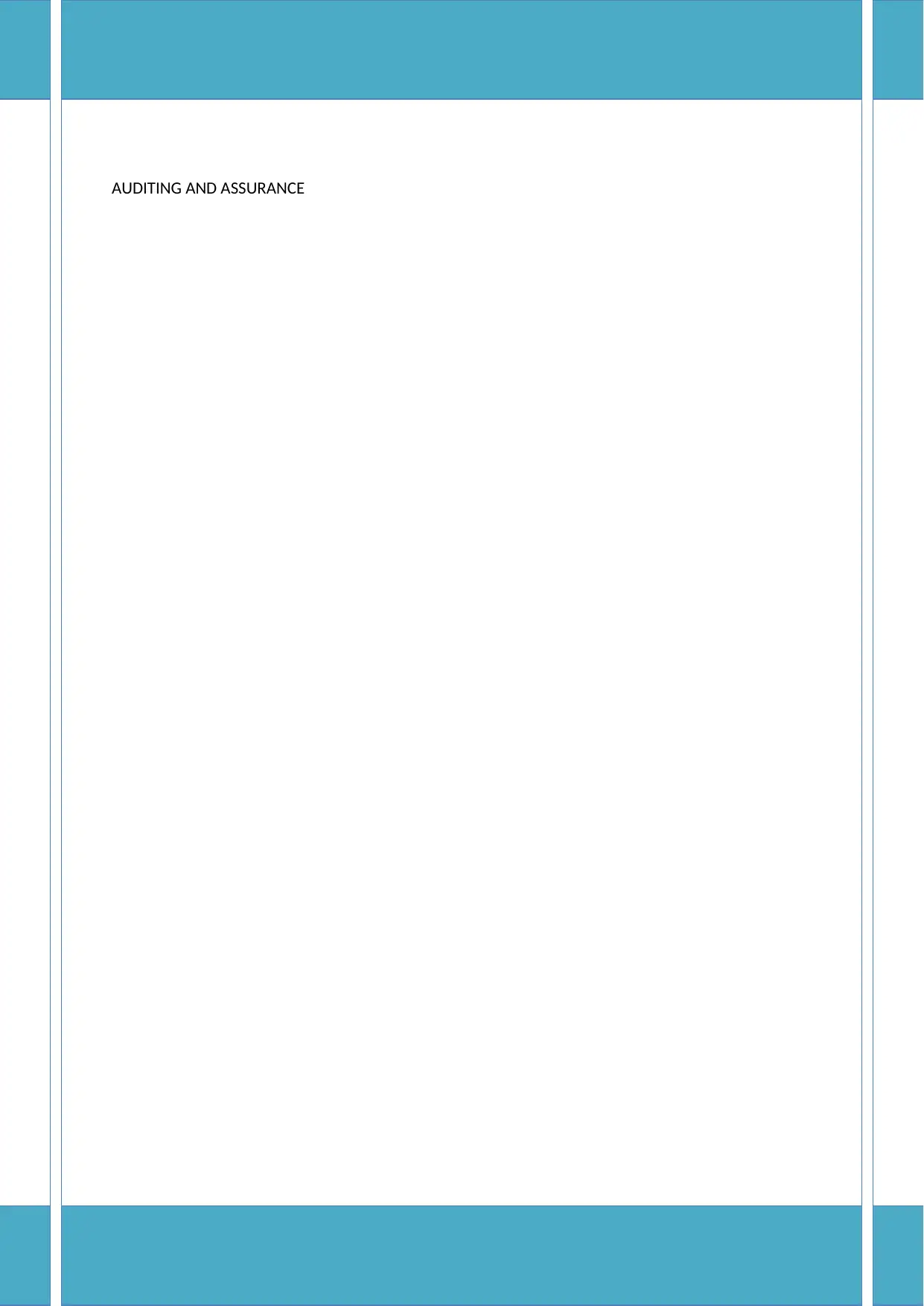
AUDITING AND ASSURANCE
Paraphrase This Document
Need a fresh take? Get an instant paraphrase of this document with our AI Paraphraser
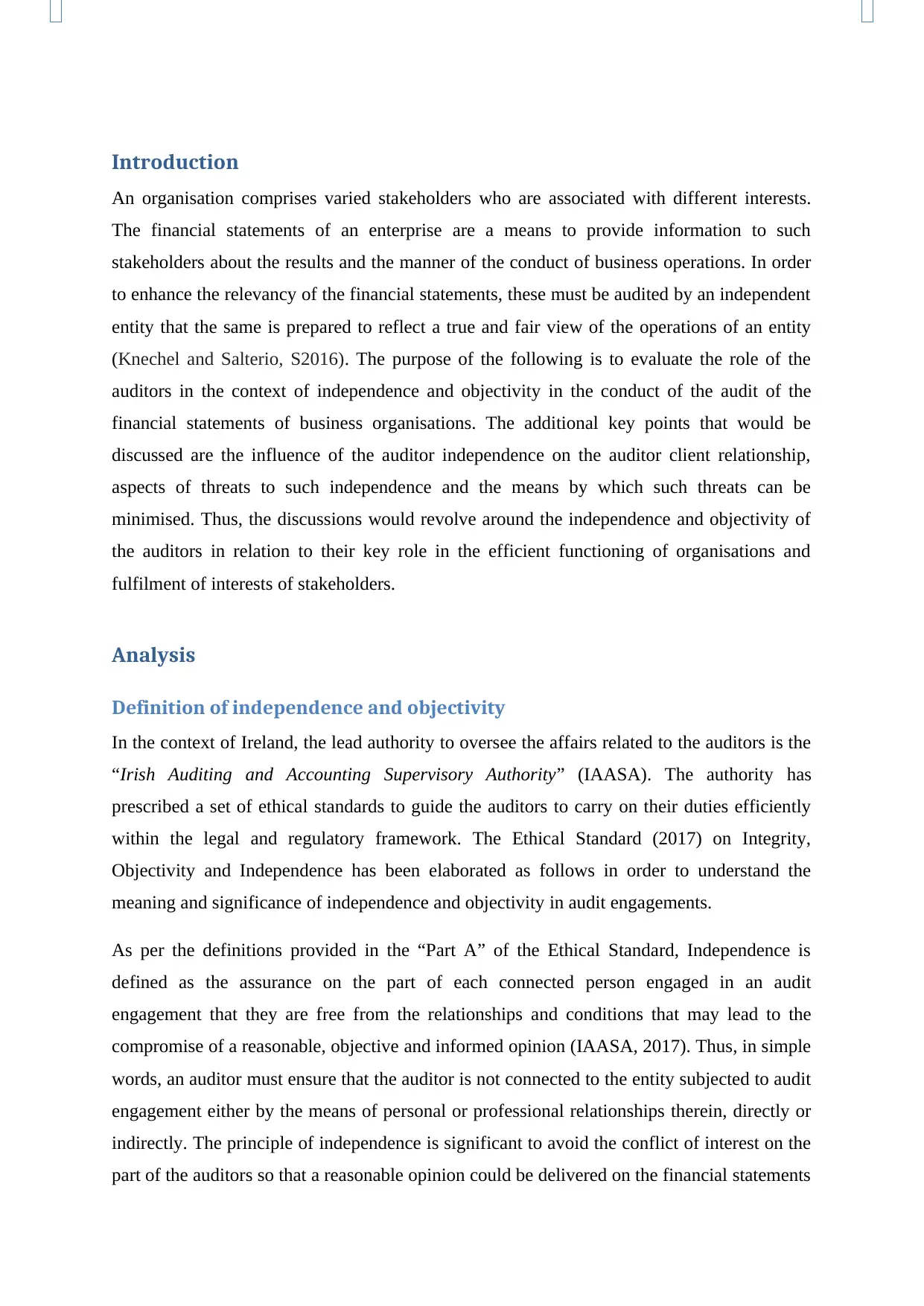
Introduction
An organisation comprises varied stakeholders who are associated with different interests.
The financial statements of an enterprise are a means to provide information to such
stakeholders about the results and the manner of the conduct of business operations. In order
to enhance the relevancy of the financial statements, these must be audited by an independent
entity that the same is prepared to reflect a true and fair view of the operations of an entity
(Knechel and Salterio, S2016). The purpose of the following is to evaluate the role of the
auditors in the context of independence and objectivity in the conduct of the audit of the
financial statements of business organisations. The additional key points that would be
discussed are the influence of the auditor independence on the auditor client relationship,
aspects of threats to such independence and the means by which such threats can be
minimised. Thus, the discussions would revolve around the independence and objectivity of
the auditors in relation to their key role in the efficient functioning of organisations and
fulfilment of interests of stakeholders.
Analysis
Definition of independence and objectivity
In the context of Ireland, the lead authority to oversee the affairs related to the auditors is the
“Irish Auditing and Accounting Supervisory Authority” (IAASA). The authority has
prescribed a set of ethical standards to guide the auditors to carry on their duties efficiently
within the legal and regulatory framework. The Ethical Standard (2017) on Integrity,
Objectivity and Independence has been elaborated as follows in order to understand the
meaning and significance of independence and objectivity in audit engagements.
As per the definitions provided in the “Part A” of the Ethical Standard, Independence is
defined as the assurance on the part of each connected person engaged in an audit
engagement that they are free from the relationships and conditions that may lead to the
compromise of a reasonable, objective and informed opinion (IAASA, 2017). Thus, in simple
words, an auditor must ensure that the auditor is not connected to the entity subjected to audit
engagement either by the means of personal or professional relationships therein, directly or
indirectly. The principle of independence is significant to avoid the conflict of interest on the
part of the auditors so that a reasonable opinion could be delivered on the financial statements
An organisation comprises varied stakeholders who are associated with different interests.
The financial statements of an enterprise are a means to provide information to such
stakeholders about the results and the manner of the conduct of business operations. In order
to enhance the relevancy of the financial statements, these must be audited by an independent
entity that the same is prepared to reflect a true and fair view of the operations of an entity
(Knechel and Salterio, S2016). The purpose of the following is to evaluate the role of the
auditors in the context of independence and objectivity in the conduct of the audit of the
financial statements of business organisations. The additional key points that would be
discussed are the influence of the auditor independence on the auditor client relationship,
aspects of threats to such independence and the means by which such threats can be
minimised. Thus, the discussions would revolve around the independence and objectivity of
the auditors in relation to their key role in the efficient functioning of organisations and
fulfilment of interests of stakeholders.
Analysis
Definition of independence and objectivity
In the context of Ireland, the lead authority to oversee the affairs related to the auditors is the
“Irish Auditing and Accounting Supervisory Authority” (IAASA). The authority has
prescribed a set of ethical standards to guide the auditors to carry on their duties efficiently
within the legal and regulatory framework. The Ethical Standard (2017) on Integrity,
Objectivity and Independence has been elaborated as follows in order to understand the
meaning and significance of independence and objectivity in audit engagements.
As per the definitions provided in the “Part A” of the Ethical Standard, Independence is
defined as the assurance on the part of each connected person engaged in an audit
engagement that they are free from the relationships and conditions that may lead to the
compromise of a reasonable, objective and informed opinion (IAASA, 2017). Thus, in simple
words, an auditor must ensure that the auditor is not connected to the entity subjected to audit
engagement either by the means of personal or professional relationships therein, directly or
indirectly. The principle of independence is significant to avoid the conflict of interest on the
part of the auditors so that a reasonable opinion could be delivered on the financial statements
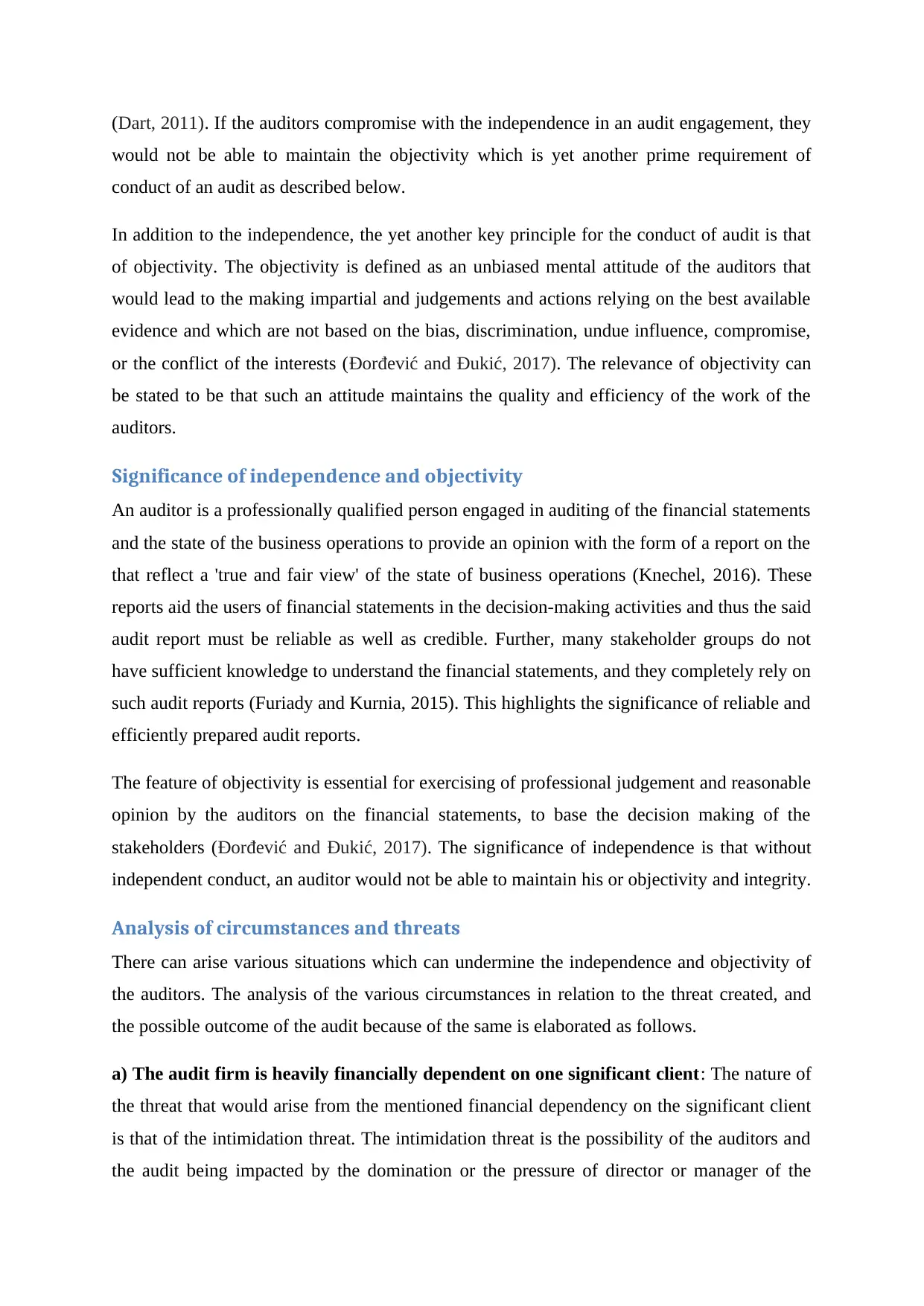
(Dart, 2011). If the auditors compromise with the independence in an audit engagement, they
would not be able to maintain the objectivity which is yet another prime requirement of
conduct of an audit as described below.
In addition to the independence, the yet another key principle for the conduct of audit is that
of objectivity. The objectivity is defined as an unbiased mental attitude of the auditors that
would lead to the making impartial and judgements and actions relying on the best available
evidence and which are not based on the bias, discrimination, undue influence, compromise,
or the conflict of the interests (Đorđević and Đukić, 2017). The relevance of objectivity can
be stated to be that such an attitude maintains the quality and efficiency of the work of the
auditors.
Significance of independence and objectivity
An auditor is a professionally qualified person engaged in auditing of the financial statements
and the state of the business operations to provide an opinion with the form of a report on the
that reflect a 'true and fair view' of the state of business operations (Knechel, 2016). These
reports aid the users of financial statements in the decision-making activities and thus the said
audit report must be reliable as well as credible. Further, many stakeholder groups do not
have sufficient knowledge to understand the financial statements, and they completely rely on
such audit reports (Furiady and Kurnia, 2015). This highlights the significance of reliable and
efficiently prepared audit reports.
The feature of objectivity is essential for exercising of professional judgement and reasonable
opinion by the auditors on the financial statements, to base the decision making of the
stakeholders (Đorđević and Đukić, 2017). The significance of independence is that without
independent conduct, an auditor would not be able to maintain his or objectivity and integrity.
Analysis of circumstances and threats
There can arise various situations which can undermine the independence and objectivity of
the auditors. The analysis of the various circumstances in relation to the threat created, and
the possible outcome of the audit because of the same is elaborated as follows.
a) The audit firm is heavily financially dependent on one significant client: The nature of
the threat that would arise from the mentioned financial dependency on the significant client
is that of the intimidation threat. The intimidation threat is the possibility of the auditors and
the audit being impacted by the domination or the pressure of director or manager of the
would not be able to maintain the objectivity which is yet another prime requirement of
conduct of an audit as described below.
In addition to the independence, the yet another key principle for the conduct of audit is that
of objectivity. The objectivity is defined as an unbiased mental attitude of the auditors that
would lead to the making impartial and judgements and actions relying on the best available
evidence and which are not based on the bias, discrimination, undue influence, compromise,
or the conflict of the interests (Đorđević and Đukić, 2017). The relevance of objectivity can
be stated to be that such an attitude maintains the quality and efficiency of the work of the
auditors.
Significance of independence and objectivity
An auditor is a professionally qualified person engaged in auditing of the financial statements
and the state of the business operations to provide an opinion with the form of a report on the
that reflect a 'true and fair view' of the state of business operations (Knechel, 2016). These
reports aid the users of financial statements in the decision-making activities and thus the said
audit report must be reliable as well as credible. Further, many stakeholder groups do not
have sufficient knowledge to understand the financial statements, and they completely rely on
such audit reports (Furiady and Kurnia, 2015). This highlights the significance of reliable and
efficiently prepared audit reports.
The feature of objectivity is essential for exercising of professional judgement and reasonable
opinion by the auditors on the financial statements, to base the decision making of the
stakeholders (Đorđević and Đukić, 2017). The significance of independence is that without
independent conduct, an auditor would not be able to maintain his or objectivity and integrity.
Analysis of circumstances and threats
There can arise various situations which can undermine the independence and objectivity of
the auditors. The analysis of the various circumstances in relation to the threat created, and
the possible outcome of the audit because of the same is elaborated as follows.
a) The audit firm is heavily financially dependent on one significant client: The nature of
the threat that would arise from the mentioned financial dependency on the significant client
is that of the intimidation threat. The intimidation threat is the possibility of the auditors and
the audit being impacted by the domination or the pressure of director or manager of the
⊘ This is a preview!⊘
Do you want full access?
Subscribe today to unlock all pages.

Trusted by 1+ million students worldwide
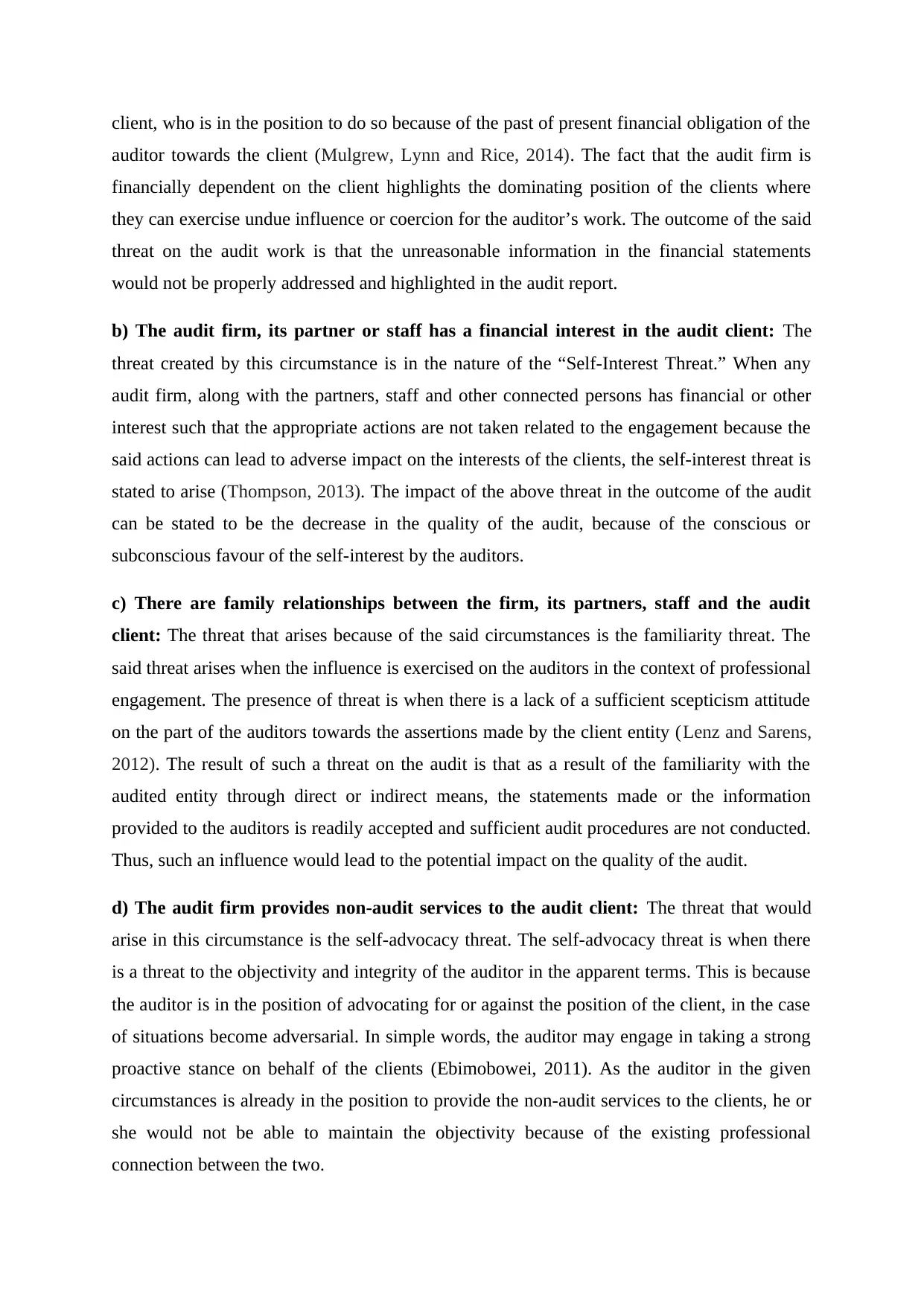
client, who is in the position to do so because of the past of present financial obligation of the
auditor towards the client (Mulgrew, Lynn and Rice, 2014). The fact that the audit firm is
financially dependent on the client highlights the dominating position of the clients where
they can exercise undue influence or coercion for the auditor’s work. The outcome of the said
threat on the audit work is that the unreasonable information in the financial statements
would not be properly addressed and highlighted in the audit report.
b) The audit firm, its partner or staff has a financial interest in the audit client: The
threat created by this circumstance is in the nature of the “Self-Interest Threat.” When any
audit firm, along with the partners, staff and other connected persons has financial or other
interest such that the appropriate actions are not taken related to the engagement because the
said actions can lead to adverse impact on the interests of the clients, the self-interest threat is
stated to arise (Thompson, 2013). The impact of the above threat in the outcome of the audit
can be stated to be the decrease in the quality of the audit, because of the conscious or
subconscious favour of the self-interest by the auditors.
c) There are family relationships between the firm, its partners, staff and the audit
client: The threat that arises because of the said circumstances is the familiarity threat. The
said threat arises when the influence is exercised on the auditors in the context of professional
engagement. The presence of threat is when there is a lack of a sufficient scepticism attitude
on the part of the auditors towards the assertions made by the client entity (Lenz and Sarens,
2012). The result of such a threat on the audit is that as a result of the familiarity with the
audited entity through direct or indirect means, the statements made or the information
provided to the auditors is readily accepted and sufficient audit procedures are not conducted.
Thus, such an influence would lead to the potential impact on the quality of the audit.
d) The audit firm provides non-audit services to the audit client: The threat that would
arise in this circumstance is the self-advocacy threat. The self-advocacy threat is when there
is a threat to the objectivity and integrity of the auditor in the apparent terms. This is because
the auditor is in the position of advocating for or against the position of the client, in the case
of situations become adversarial. In simple words, the auditor may engage in taking a strong
proactive stance on behalf of the clients (Ebimobowei, 2011). As the auditor in the given
circumstances is already in the position to provide the non-audit services to the clients, he or
she would not be able to maintain the objectivity because of the existing professional
connection between the two.
auditor towards the client (Mulgrew, Lynn and Rice, 2014). The fact that the audit firm is
financially dependent on the client highlights the dominating position of the clients where
they can exercise undue influence or coercion for the auditor’s work. The outcome of the said
threat on the audit work is that the unreasonable information in the financial statements
would not be properly addressed and highlighted in the audit report.
b) The audit firm, its partner or staff has a financial interest in the audit client: The
threat created by this circumstance is in the nature of the “Self-Interest Threat.” When any
audit firm, along with the partners, staff and other connected persons has financial or other
interest such that the appropriate actions are not taken related to the engagement because the
said actions can lead to adverse impact on the interests of the clients, the self-interest threat is
stated to arise (Thompson, 2013). The impact of the above threat in the outcome of the audit
can be stated to be the decrease in the quality of the audit, because of the conscious or
subconscious favour of the self-interest by the auditors.
c) There are family relationships between the firm, its partners, staff and the audit
client: The threat that arises because of the said circumstances is the familiarity threat. The
said threat arises when the influence is exercised on the auditors in the context of professional
engagement. The presence of threat is when there is a lack of a sufficient scepticism attitude
on the part of the auditors towards the assertions made by the client entity (Lenz and Sarens,
2012). The result of such a threat on the audit is that as a result of the familiarity with the
audited entity through direct or indirect means, the statements made or the information
provided to the auditors is readily accepted and sufficient audit procedures are not conducted.
Thus, such an influence would lead to the potential impact on the quality of the audit.
d) The audit firm provides non-audit services to the audit client: The threat that would
arise in this circumstance is the self-advocacy threat. The self-advocacy threat is when there
is a threat to the objectivity and integrity of the auditor in the apparent terms. This is because
the auditor is in the position of advocating for or against the position of the client, in the case
of situations become adversarial. In simple words, the auditor may engage in taking a strong
proactive stance on behalf of the clients (Ebimobowei, 2011). As the auditor in the given
circumstances is already in the position to provide the non-audit services to the clients, he or
she would not be able to maintain the objectivity because of the existing professional
connection between the two.
Paraphrase This Document
Need a fresh take? Get an instant paraphrase of this document with our AI Paraphraser
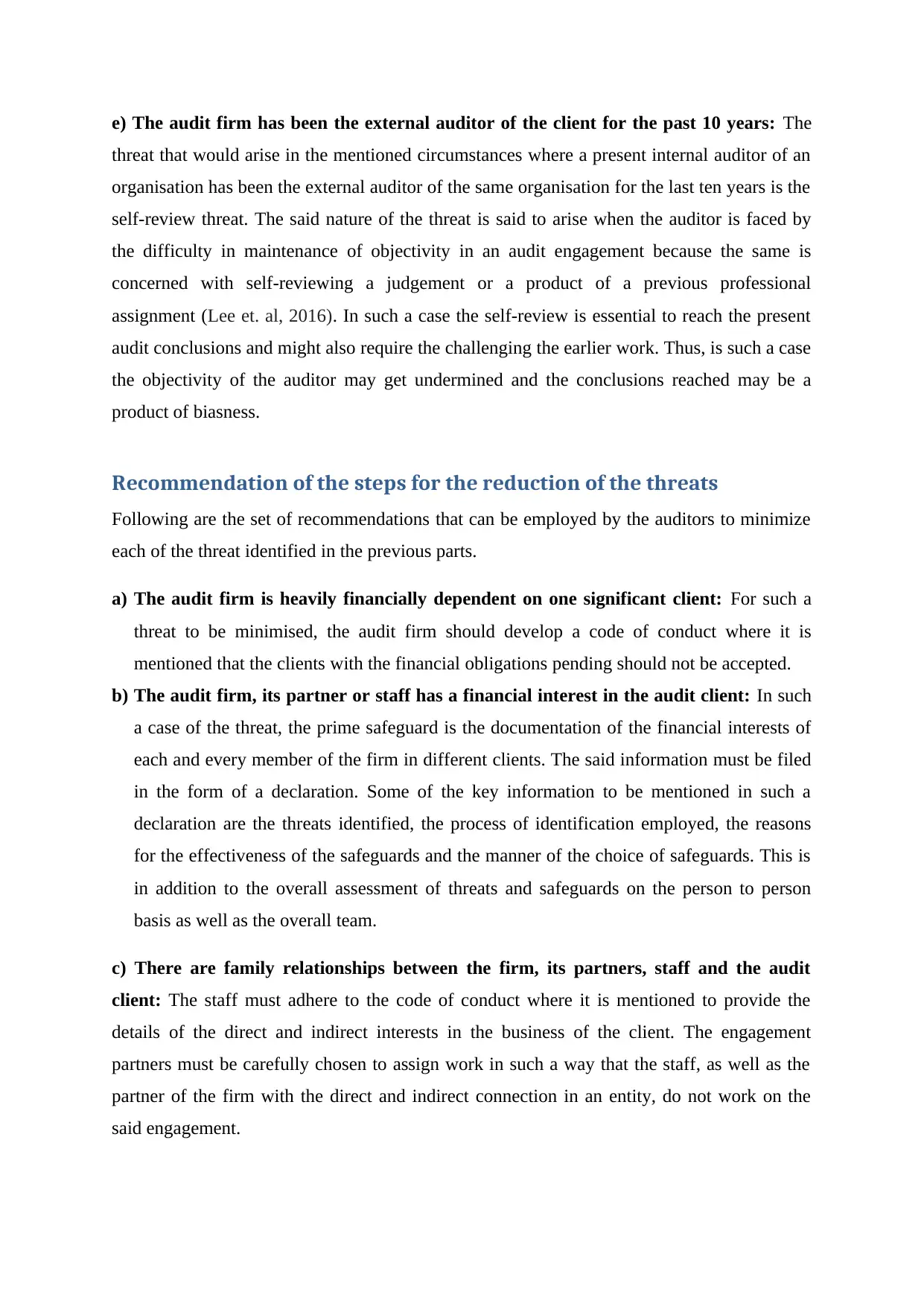
e) The audit firm has been the external auditor of the client for the past 10 years: The
threat that would arise in the mentioned circumstances where a present internal auditor of an
organisation has been the external auditor of the same organisation for the last ten years is the
self-review threat. The said nature of the threat is said to arise when the auditor is faced by
the difficulty in maintenance of objectivity in an audit engagement because the same is
concerned with self-reviewing a judgement or a product of a previous professional
assignment (Lee et. al, 2016). In such a case the self-review is essential to reach the present
audit conclusions and might also require the challenging the earlier work. Thus, is such a case
the objectivity of the auditor may get undermined and the conclusions reached may be a
product of biasness.
Recommendation of the steps for the reduction of the threats
Following are the set of recommendations that can be employed by the auditors to minimize
each of the threat identified in the previous parts.
a) The audit firm is heavily financially dependent on one significant client: For such a
threat to be minimised, the audit firm should develop a code of conduct where it is
mentioned that the clients with the financial obligations pending should not be accepted.
b) The audit firm, its partner or staff has a financial interest in the audit client: In such
a case of the threat, the prime safeguard is the documentation of the financial interests of
each and every member of the firm in different clients. The said information must be filed
in the form of a declaration. Some of the key information to be mentioned in such a
declaration are the threats identified, the process of identification employed, the reasons
for the effectiveness of the safeguards and the manner of the choice of safeguards. This is
in addition to the overall assessment of threats and safeguards on the person to person
basis as well as the overall team.
c) There are family relationships between the firm, its partners, staff and the audit
client: The staff must adhere to the code of conduct where it is mentioned to provide the
details of the direct and indirect interests in the business of the client. The engagement
partners must be carefully chosen to assign work in such a way that the staff, as well as the
partner of the firm with the direct and indirect connection in an entity, do not work on the
said engagement.
threat that would arise in the mentioned circumstances where a present internal auditor of an
organisation has been the external auditor of the same organisation for the last ten years is the
self-review threat. The said nature of the threat is said to arise when the auditor is faced by
the difficulty in maintenance of objectivity in an audit engagement because the same is
concerned with self-reviewing a judgement or a product of a previous professional
assignment (Lee et. al, 2016). In such a case the self-review is essential to reach the present
audit conclusions and might also require the challenging the earlier work. Thus, is such a case
the objectivity of the auditor may get undermined and the conclusions reached may be a
product of biasness.
Recommendation of the steps for the reduction of the threats
Following are the set of recommendations that can be employed by the auditors to minimize
each of the threat identified in the previous parts.
a) The audit firm is heavily financially dependent on one significant client: For such a
threat to be minimised, the audit firm should develop a code of conduct where it is
mentioned that the clients with the financial obligations pending should not be accepted.
b) The audit firm, its partner or staff has a financial interest in the audit client: In such
a case of the threat, the prime safeguard is the documentation of the financial interests of
each and every member of the firm in different clients. The said information must be filed
in the form of a declaration. Some of the key information to be mentioned in such a
declaration are the threats identified, the process of identification employed, the reasons
for the effectiveness of the safeguards and the manner of the choice of safeguards. This is
in addition to the overall assessment of threats and safeguards on the person to person
basis as well as the overall team.
c) There are family relationships between the firm, its partners, staff and the audit
client: The staff must adhere to the code of conduct where it is mentioned to provide the
details of the direct and indirect interests in the business of the client. The engagement
partners must be carefully chosen to assign work in such a way that the staff, as well as the
partner of the firm with the direct and indirect connection in an entity, do not work on the
said engagement.
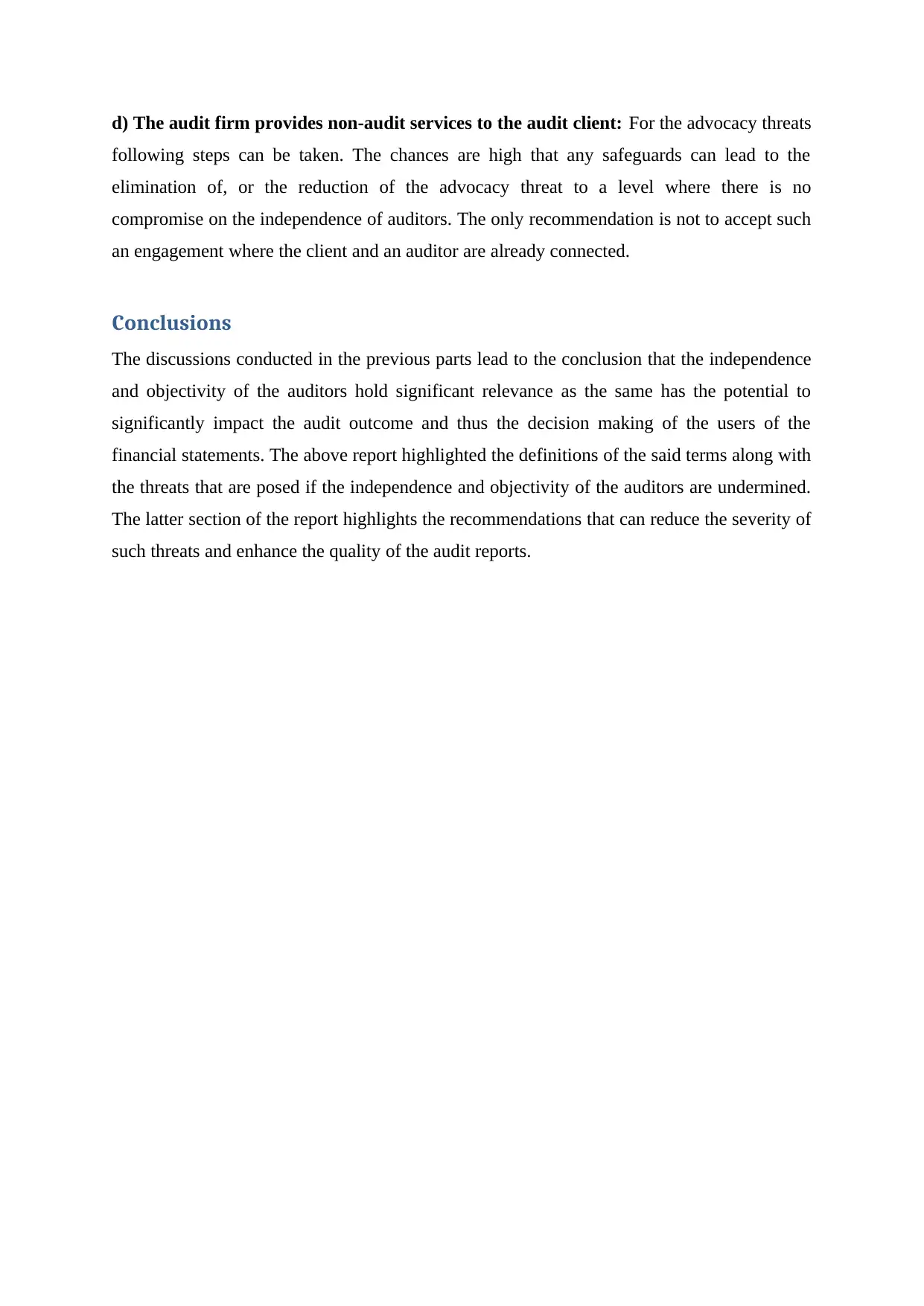
d) The audit firm provides non-audit services to the audit client: For the advocacy threats
following steps can be taken. The chances are high that any safeguards can lead to the
elimination of, or the reduction of the advocacy threat to a level where there is no
compromise on the independence of auditors. The only recommendation is not to accept such
an engagement where the client and an auditor are already connected.
Conclusions
The discussions conducted in the previous parts lead to the conclusion that the independence
and objectivity of the auditors hold significant relevance as the same has the potential to
significantly impact the audit outcome and thus the decision making of the users of the
financial statements. The above report highlighted the definitions of the said terms along with
the threats that are posed if the independence and objectivity of the auditors are undermined.
The latter section of the report highlights the recommendations that can reduce the severity of
such threats and enhance the quality of the audit reports.
following steps can be taken. The chances are high that any safeguards can lead to the
elimination of, or the reduction of the advocacy threat to a level where there is no
compromise on the independence of auditors. The only recommendation is not to accept such
an engagement where the client and an auditor are already connected.
Conclusions
The discussions conducted in the previous parts lead to the conclusion that the independence
and objectivity of the auditors hold significant relevance as the same has the potential to
significantly impact the audit outcome and thus the decision making of the users of the
financial statements. The above report highlighted the definitions of the said terms along with
the threats that are posed if the independence and objectivity of the auditors are undermined.
The latter section of the report highlights the recommendations that can reduce the severity of
such threats and enhance the quality of the audit reports.
⊘ This is a preview!⊘
Do you want full access?
Subscribe today to unlock all pages.

Trusted by 1+ million students worldwide
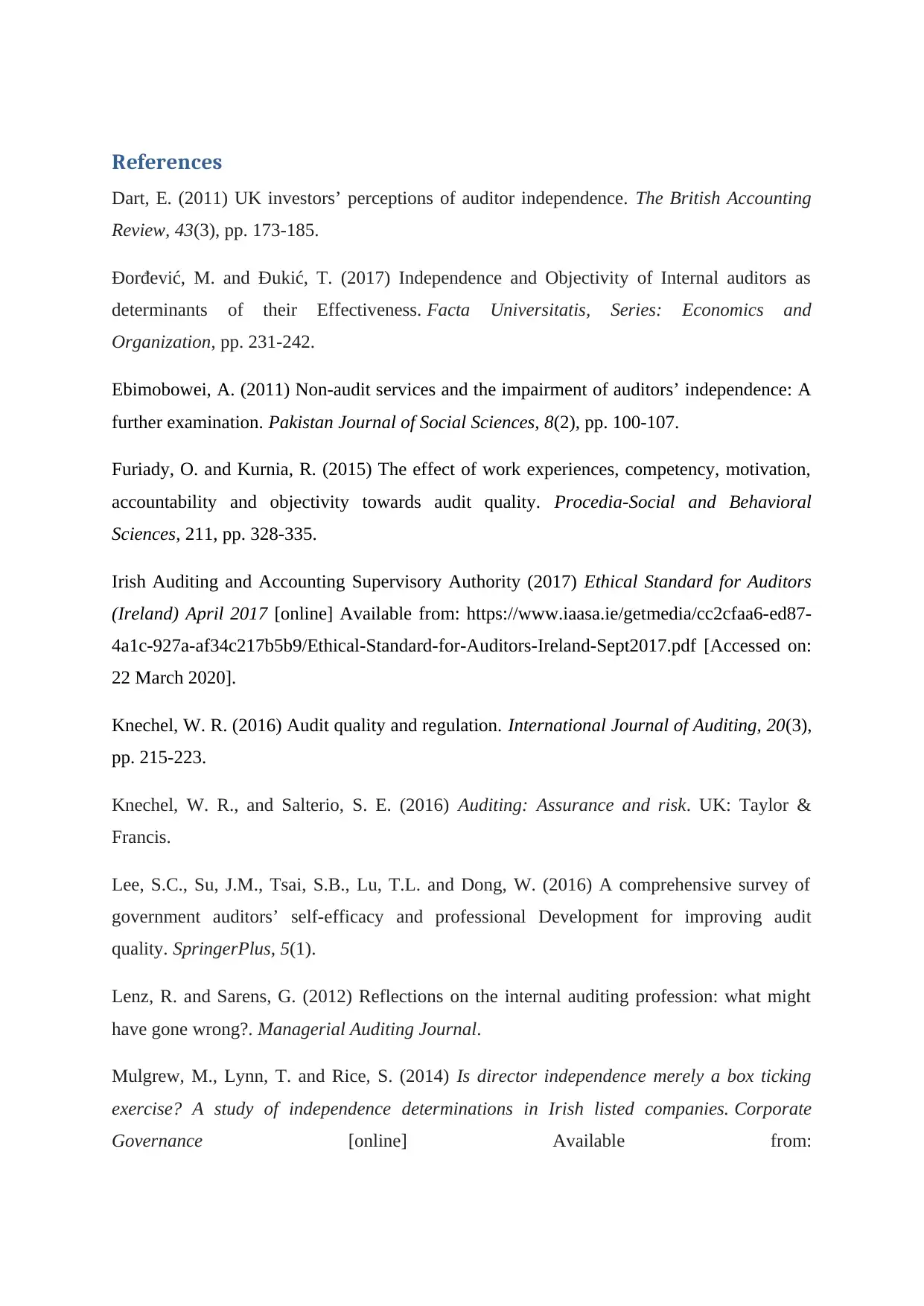
References
Dart, E. (2011) UK investors’ perceptions of auditor independence. The British Accounting
Review, 43(3), pp. 173-185.
Đorđević, M. and Đukić, T. (2017) Independence and Objectivity of Internal auditors as
determinants of their Effectiveness. Facta Universitatis, Series: Economics and
Organization, pp. 231-242.
Ebimobowei, A. (2011) Non-audit services and the impairment of auditors’ independence: A
further examination. Pakistan Journal of Social Sciences, 8(2), pp. 100-107.
Furiady, O. and Kurnia, R. (2015) The effect of work experiences, competency, motivation,
accountability and objectivity towards audit quality. Procedia-Social and Behavioral
Sciences, 211, pp. 328-335.
Irish Auditing and Accounting Supervisory Authority (2017) Ethical Standard for Auditors
(Ireland) April 2017 [online] Available from: https://www.iaasa.ie/getmedia/cc2cfaa6-ed87-
4a1c-927a-af34c217b5b9/Ethical-Standard-for-Auditors-Ireland-Sept2017.pdf [Accessed on:
22 March 2020].
Knechel, W. R. (2016) Audit quality and regulation. International Journal of Auditing, 20(3),
pp. 215-223.
Knechel, W. R., and Salterio, S. E. (2016) Auditing: Assurance and risk. UK: Taylor &
Francis.
Lee, S.C., Su, J.M., Tsai, S.B., Lu, T.L. and Dong, W. (2016) A comprehensive survey of
government auditors’ self-efficacy and professional Development for improving audit
quality. SpringerPlus, 5(1).
Lenz, R. and Sarens, G. (2012) Reflections on the internal auditing profession: what might
have gone wrong?. Managerial Auditing Journal.
Mulgrew, M., Lynn, T. and Rice, S. (2014) Is director independence merely a box ticking
exercise? A study of independence determinations in Irish listed companies. Corporate
Governance [online] Available from:
Dart, E. (2011) UK investors’ perceptions of auditor independence. The British Accounting
Review, 43(3), pp. 173-185.
Đorđević, M. and Đukić, T. (2017) Independence and Objectivity of Internal auditors as
determinants of their Effectiveness. Facta Universitatis, Series: Economics and
Organization, pp. 231-242.
Ebimobowei, A. (2011) Non-audit services and the impairment of auditors’ independence: A
further examination. Pakistan Journal of Social Sciences, 8(2), pp. 100-107.
Furiady, O. and Kurnia, R. (2015) The effect of work experiences, competency, motivation,
accountability and objectivity towards audit quality. Procedia-Social and Behavioral
Sciences, 211, pp. 328-335.
Irish Auditing and Accounting Supervisory Authority (2017) Ethical Standard for Auditors
(Ireland) April 2017 [online] Available from: https://www.iaasa.ie/getmedia/cc2cfaa6-ed87-
4a1c-927a-af34c217b5b9/Ethical-Standard-for-Auditors-Ireland-Sept2017.pdf [Accessed on:
22 March 2020].
Knechel, W. R. (2016) Audit quality and regulation. International Journal of Auditing, 20(3),
pp. 215-223.
Knechel, W. R., and Salterio, S. E. (2016) Auditing: Assurance and risk. UK: Taylor &
Francis.
Lee, S.C., Su, J.M., Tsai, S.B., Lu, T.L. and Dong, W. (2016) A comprehensive survey of
government auditors’ self-efficacy and professional Development for improving audit
quality. SpringerPlus, 5(1).
Lenz, R. and Sarens, G. (2012) Reflections on the internal auditing profession: what might
have gone wrong?. Managerial Auditing Journal.
Mulgrew, M., Lynn, T. and Rice, S. (2014) Is director independence merely a box ticking
exercise? A study of independence determinations in Irish listed companies. Corporate
Governance [online] Available from:
Paraphrase This Document
Need a fresh take? Get an instant paraphrase of this document with our AI Paraphraser
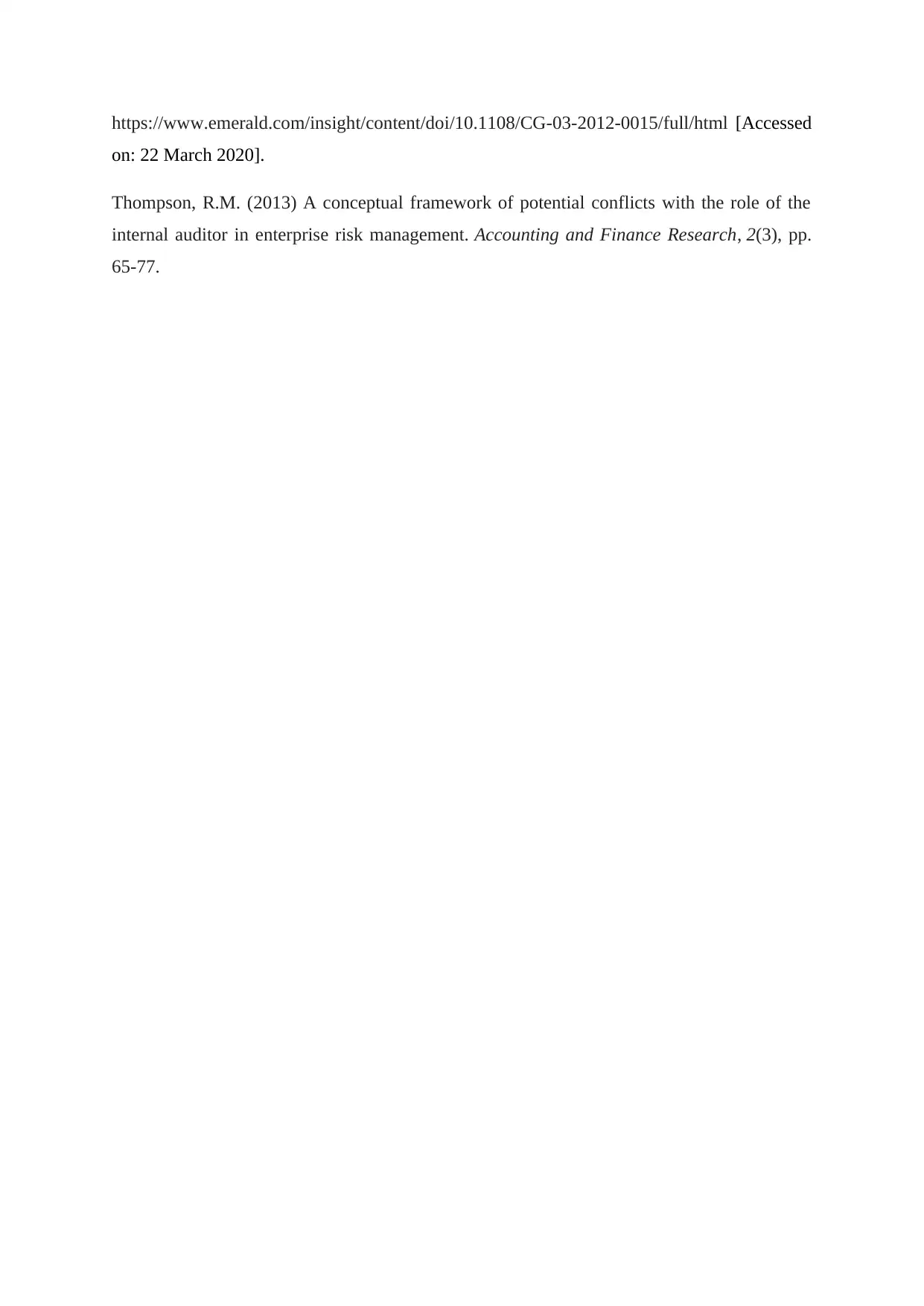
https://www.emerald.com/insight/content/doi/10.1108/CG-03-2012-0015/full/html [Accessed
on: 22 March 2020].
Thompson, R.M. (2013) A conceptual framework of potential conflicts with the role of the
internal auditor in enterprise risk management. Accounting and Finance Research, 2(3), pp.
65-77.
on: 22 March 2020].
Thompson, R.M. (2013) A conceptual framework of potential conflicts with the role of the
internal auditor in enterprise risk management. Accounting and Finance Research, 2(3), pp.
65-77.
1 out of 8
Related Documents
Your All-in-One AI-Powered Toolkit for Academic Success.
+13062052269
info@desklib.com
Available 24*7 on WhatsApp / Email
![[object Object]](/_next/static/media/star-bottom.7253800d.svg)
Unlock your academic potential
Copyright © 2020–2025 A2Z Services. All Rights Reserved. Developed and managed by ZUCOL.


